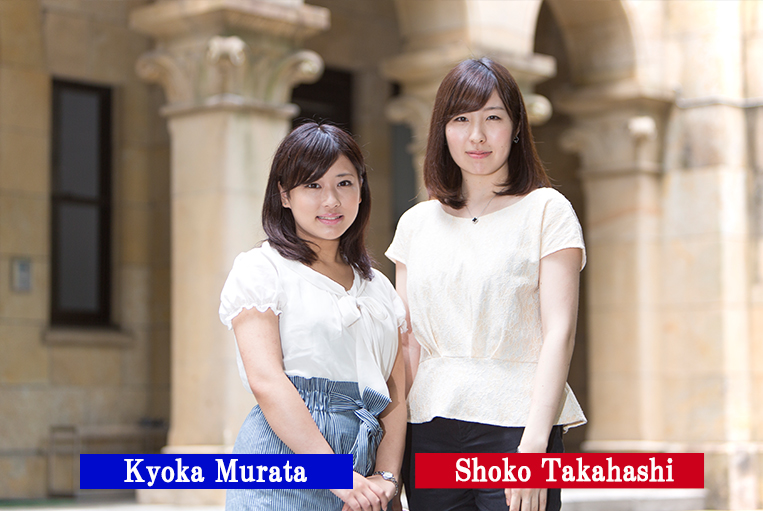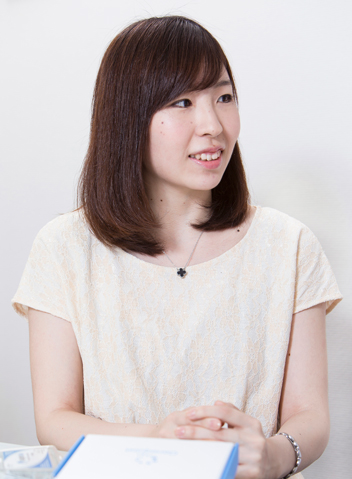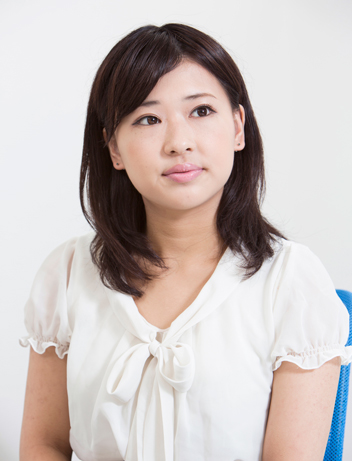Female Student Discussion
Female Student Discussion
A graduate student who started a genetic testing company and an undergraduate student who works as the editor-in-chief of a free magazine for young women: what did they have to say to each other as fellow female UTokyo students in different stages of their academic careers?


Editor-in-Chief Murai's last issue (Issue 8) came out in October 2014.
Kyoka Murata
Third-year undergraduate student, Faculty of Letters
Editor-in-Chief of the free magazine biscUiT
biscUiT, first published in 2011, is printed on 36 B5-sized pages and has a circulation of 3,000. The paper is distributed at various locations on the Komaba Campus including the Student Building, the Co-op Cafeteria, Campus Plaza and Italian Tomato Cafe Jr. On the Hongo Campus, one can find biscUiT at the Faculties of Law and Letters Buildings 1 & 2, the Faculty of Education Building, the T-Lounge, and other places.
http://utbiscuit.xxxx.jp/

This is the kit that comes in the mail one week after applying for genetic testing online.
Shoko Takahashi
Third-year Doctoral degree student, Graduate School of Agricultural and Life Sciences
President, Genequest Inc.
For 49,800 yen, Genequest provides a service that analyzes your saliva placed in a container and sent to them, returning results in four to six weeks. The company is also collaborating with Yahoo! on HealthData Lab, a lifestyle improvement advice project started by Yahoo! in autumn 2014.
http://genequest.jp/
Kyoka: I volunteer to work as an editor-in-chief of a free magazine for UTokyo women. I try to make a magazine tailored to their needs, offering interesting and useful articles including information on restaurants and shops near our campuses. I major in sociology and have an interest in how communication methods are changing through societal trends.
Shoko: I am researching ways to analyze lifestyle disease prevention mechanisms at the genetic level. Last June, I started my company, which takes a sample of your genes from your saliva and analyzes it to inform you about what kinds of diseases you have a risk of getting. Since it wasn't feasible to create the kind of framework needed to improve both this service and do research by just being at the University, I chose to start my own company.
Kyoka: What kinds of things can people find out when they use your service? Can people know if there's a probability of them having a stroke, for example?
Shoko: That's right. You won't necessarily get the diseases that the test shows, but you can know from the test results if your body type is predisposed to getting those diseases.
Kyoka: That sounds a little bit scary. If I were told I was predisposed to get an incurable disease, I…
Shoko: That's not a problem. The test covers only preventable lifestyle diseases, so there are lots of women, for instance, who do the tests to find out what kind of diets will work best for their bodies. Like to find out if they should limit their intake of either sugar or fat.
— What inspired you to start a company (Shoko) and get into editing (Kyoka)?
Shoko: I felt like just staying in the lab and doing genetic analysis wouldn't change the world, and that I should create a more feasible framework in order to do that. There was an older colleague in my lab who was knowledgeable about entrepreneurship, so I naturally became aware of that option. A sense of speed and urgency means everything for venture companies, so I want to be able to focus solely on my company as soon as possible.
Kyoka: Even before entering the University, I was interested in print and other forms of media. I thought the work of editing a women's magazine would suit me because I like have a getting with other girls and doing things together like having girls' nights out.
Shoko: Unfortunately, I have to say that I've never heard of biscUiT before.
Kyoka: On the Komaba Campus, you can find our magazine in a lot of places. On the Hongo Campus, however, we haven't really been able to secure many locations to distribute it.
Shoko: I started at UTokyo as a graduate student, so I don't have much to do with Komaba…
— Why did you come to UTokyo?

Shoko: At my alma mater, the Kyoto University Faculty of Agriculture, the majority of those continuing on to graduate school would just go to one at Kyoto University. I felt like if I did the same thing that I would just laze about and not get things done at a fast pace due to the environment being too familiar and comfortable. I thought that in order to change myself, I had to change where I was. Then, one Sunday evening during spring break of my senior year, it came to me: “Oh! I'll go to Tokyo.”
Kyoka: That's the opposite version of Japan Railway's advertisement “Oh! I'll go to Kyoto.”
Shoko: I came to Tokyo on an overnight train. It was the first time I had ever been in Tokyo. I did some sightseeing, and then went to see UTokyo. I felt like the city and the University would really act as a source of motivation and stimulation for me, so I decided to enroll in UTokyo.
Kyoka: Are there any differences between UTokyo and Kyoto University?
Shoko: UTokyo students are serious-minded. They can even work hard on things that they have no interest in. Kyoto University students, on the other hand, won't do anything that they have no interest in.
Kyoka: My father graduated from Kyoto University. Hearing him talk about his days at Kyoto University made me imagine what fun and free lives students at Kyoto University can enjoy. I myself wanted to go to a university in Tokyo because the amount of information you can receive is by far greater in Tokyo than in my hometown, Ibaraki. Kyoto was one of my options, but I was worried that Kyoto would be too far from my hometown. In addition, UTokyo appealed to me a lot because of its unique educational system that gives me an extra two years to decide what I want to specialize in.
Shoko: I went to Kyoto University for the same reason. It's close to home, and the Faculty of Agriculture covers a wide variety of research areas. For students in the sciences who hadn't decided what specialized field to go into, the Faculty of Agriculture was the place to go.
— There's often a lot said about the low number of female students at UTokyo.
Shoko: Female students are the overwhelming majority in my lab right now, actually.
Kyoka: When I enrolled in Humanities III, 12 out of my 34 classmates were female, and almost 20 out of the 50 students at the Department I'm in now are female. So I don't feel like female students are a small minority in the University.
Shoko: I get the impression that female UTokyo students view themselves relatively rather than absolutely, and they don't show off. Girls from other universities look like they're trying to gain confidence by appealing to others about how they are enjoying themselves, but I don't think there are many UTokyo girls who are like that.
Kyoka: In undergraduate courses, a significant number of female students here at UTokyo are typical college girls. Those kinds of girls don't want to stay in research; they want to go out into the world after graduation to work at companies instead.
— So, you did a special feature on students who like to do things by themselves in the seventh issue of biscUiT.

Kyoka: Yeah, since I felt like many UTokyo female students like being by themselves. Shoko: I do, too. I usually go eat lunch alone when I'm on campus. It's natural to be by yourself when you're at UTokyo, so that really helps.
Shoko: I do, too. I usually go eat lunch alone when I'm on campus. It's natural to be by yourself when you're at UTokyo, so that really helps.
Kyoka: Tough women like Shoko-san who are doing all sorts of amazing things can be seen throughout the University. On the other hand, there are many girls who think they are just average. I wanted to make biscUiT a magazine that would feel relevant to these kinds of average students, too. That reminds me—aren't some of the pathways through Hongo Campus pretty bumpy? I feel like I'm going to fall down a lot when I walk on them. All the girls wear high heels when they come here at first, but because of these pathways, they gradually shift to wearing shoes with lower heels.
Shoko: My heels get caught between stones on the pathways, too. I don't like places that are difficult to walk in, so I use a bicycle even for short distances.
— What do you think about UTokyo boys?
Shoko: A lot of them are really proud of themselves. That's a characteristic that you don't see in Kyoto University boys. It's like their high ideals are the foundation of their hard work. Also, I think many of them can work hard on something up to the last minute, which might be because they had successful experiences with the university entrance exams.
Kyoka: Many of them are easy to talk to, but some of them seem kind of arrogant.
— How did you change since you came to UTokyo?
Shoko: I used to be shy, but I didn't know anyone when I came to Tokyo, so I had no choice but to dive right in to this unknown community. While doing that I realized that not only had my community changed, but I had changed, too.
Kyoka: Similarly, after coming to UTokyo, I became able to go to places I had never been to before. This may be partly because the University offers a lot of opportunities for students to experience what they otherwise are unable to do by themselves. Examples of unique experiences I've had at UTokyo include volunteer work at disaster-stricken areas, academic-corporate collaboration lectures by Hakuhodo, a PR company, and, of course, this student discussion.
— What does being “tough” mean to you?
Shoko: I don't think being tough is about not giving up no matter what; it's about being able to stand up again right away when you are discouraged. Toughness is something you can gain only through experience; in other words, if you experience something, you will become tougher because of it. I think toughness is something that can be made.
Kyoka: I think being tough is about being not afraid of change. When you start doing something new, you may change in either positive or negative way. Not being afraid of experiencing big changes will start you off on the path to becoming tough.
— Upcoming plans and developments?
Shoko: Society still hasn't completely grasped what the meaning of genetic analysis is, so I have partnered up with Yahoo! to broaden the range of my company's services themselves. On an individual level, I'm still a “freshman” when it comes to learning about management. I'm working on gaining more experience since I'd like to be able to say with confidence that I'm a business executive.
Kyoka: My goal is to have our magazine become even more relevant to readers while improving distribution on the Hongo Campus. I want to publish an issue that represents this goal so that I can pass down the running of biscUiT to younger students. Personally, I am going to do several internships during summer vacation and join a PR company after graduation.
— Finally, what are your impressions of each other?
Shoko: I got the impression that Kyoka is someone whose core cannot be shaken. I don't think she really needs any advice from me, but I will say that it would be a good idea for her to gain a variety of experiences now while she can. (to Kyoka) My company is looking for people to participate in a free trial of our services, so if you're so inclined, why don't you apply and give it a try?
Kyoka: All of my seniors at UTokyo are talented and amazing. Learning about Shoko-san today made me feel like she truly represents this remarkable group of people. I hope I can follow in their footsteps… As for the genetic testing trial, I definitely want to find out what kind of diet would suit me!

Kyoka before UTokyo





